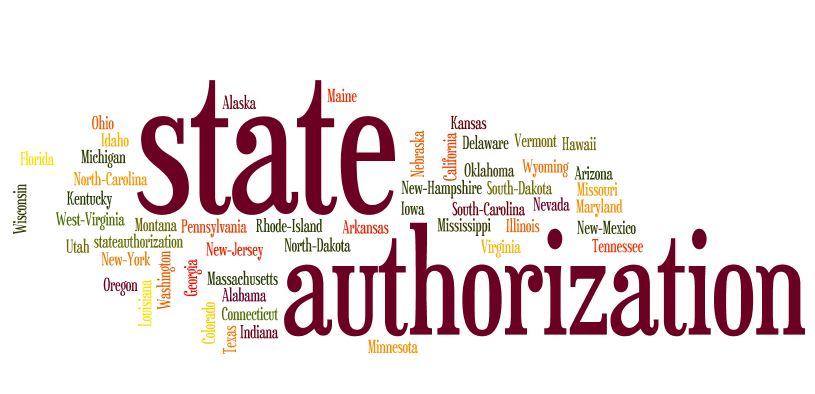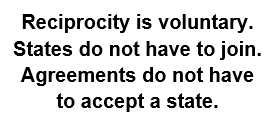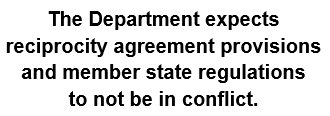Education Department Clarifies Its Intent on State Authorization Reciprocity
Published by: WCET | 1/9/2017
Tags: Distance Education, Financial Aid, Reciprocity, Regulation, SARA, State Authorization, Title IV, U.S. Department Of Education
Published by: WCET | 1/9/2017
Tags: Distance Education, Financial Aid, Reciprocity, Regulation, SARA, State Authorization, Title IV, U.S. Department Of Education
To paraphrase Mark Twain: “The report of SARA’s death was an exaggeration.”
Department of Education officials recently told me that they recognize the hard work over many years in creating interstate reciprocity agreements for state authorization. They also expressed surprise over the perceptions that their new state authorization regulations would harm reciprocity.
In a call initiated by the Department and a subsequent call to answer some follow-up questions, well-placed Department officials clarified widespread “misconceptions” advanced by me and many others. This blog post presents my interpretation of what was said in those calls. Due to these discussions, my view of the intent of the Department’s new reciprocity definition has changed.
 This is welcome news. In Cheryl Dowd’s (the State Authorization Network director) and my initial take on the regulation and the subsequent reactions from several sources that we reported late last year, we all thought the regulation would end reciprocity. After all, if a state could do whatever it wants despite an agreement, what use is the agreement?
This is welcome news. In Cheryl Dowd’s (the State Authorization Network director) and my initial take on the regulation and the subsequent reactions from several sources that we reported late last year, we all thought the regulation would end reciprocity. After all, if a state could do whatever it wants despite an agreement, what use is the agreement?
From what I heard in the calls, the Department intended the exact opposite. It continues its long-held support for reciprocity agreements as a way for institutions to demonstrate state authorization of distance education. Additionally, it recognizes the rights of states participating in the agreement to set the provisions for reciprocity and the decide what states may join.
A Brief History of the “Reciprocity” Definition
When the Department issued its proposed state authorization regulations earlier this year, they included a definition of a reciprocity agreement, saying that an agreement acceptable for demonstrating compliance with federal financial aid rules could not prohibit a state from enforcing its consumer protection laws. Several of those submitting official comments on the regulations (including us) requested this definition be clarified. After all, different people had different ideas as to what would count as a “consumer protection” law. The definition as proposed last summer:
“An agreement between two or more States that authorizes an institution located and legally authorized in a State covered by the agreement to provide postsecondary education through distance education or correspondence courses to students in other States covered by the agreement and does not prohibit a participating State from enforcing its own consumer protection laws.”
Note that the Department talks only about the “concept” of reciprocity agreements as it is possible that subsets of states may decide to create multiple agreements. In this regulation, the Department is not addressing a specific agreement, such as SARA – the State Authorization Reciprocity Agreement. Even though SARA is the best-known reciprocity agreement for distance education. It counts 47 States (plus DC) as members and 1,300 participating institutions. In full disclosure, I was deeply involved in forming that agreement.
The final regulation (issued in December) included the following, expanded definition of an acceptable reciprocity agreement:
“An agreement between two or more States that authorizes an institution located and legally authorized in a State covered by the agreement to provide postsecondary education through distance education or correspondence courses to students residing in other States covered by the agreement and does not prohibit any State in the agreement from enforcing its own statutes and regulations, whether general or specifically directed at all or a subgroup of educational institutions.”
 On page 16 of the final regulation, the Department made the following statement in responding to official requests gathered during the open comment period regarding the proposed definition of a reciprocity agreement:
On page 16 of the final regulation, the Department made the following statement in responding to official requests gathered during the open comment period regarding the proposed definition of a reciprocity agreement:
“…we believe that if a State has laws that are specific to postsecondary institutions, the State’s laws should not be preempted by a reciprocity agreement that does not recognize those State laws. Thus, we believe that the definition of a State authorization reciprocity agreement should encompass a State’s statutes and the regulations interpreting those statutes, both general and specific, including those directed at all or a subset of educational institutions.”
Those of us outside the Department interpreted that language to mean that a state could enforce any of its regulations even if that enforcement conflicted with a reciprocity agreement it had joined. You can see how we came to that conclusion.
Based on my recent conversations with Department personnel, our interpretation was wrong.
Key Takeaways Regarding the Department’s Intent
What did they intend? The intent of the language in the final regulation was to assure that a reciprocity agreement could not supersede state laws not covered in the agreement. The language required some “threading the needle” between state and federal laws and some of the Department’s ultimate intent seemed to be lost in the final wording.
Let me interpret the Department’s intent in my own words based on our recent conversations. In brief, the Department considers a reciprocity agreement to be in compliance with their requirements as long as the state’s laws and regulations and the provisions of any reciprocity agreement the state joined are not in conflict.
These details were fleshed out a bit more in our conversations:


The Bottom Line and Making this Official
Bottom line: This is great news for SARA and, more importantly, the countless students who are now protected by that agreement and had no protection just a few years ago.
Again, this blog post presents my interpretation of what Education Department leadership intended all along, but was hard to determine from the final regulation. A Department official suggested that we submit a request to the Department to officially clarify (perhaps through a “Dear Colleague” letter) the intent of the reciprocity agreement definition. WCET, the State Authorization Network, and SARA will, together, promptly draft an official request for clarification.
Meanwhile, this places me in an awkward position. The Department staff reached out to me to clarify their intent. They are completely aware that I will share my impressions publicly, but they asked that those participating in the calls not be named. You can draw your own conclusions, but I think it has much to do with the calendar.
Glad to See the Department Support Reciprocity
As a result of these conversations with Education Department leadership, my main objection to the recently released regulation has been mitigated. I still have some other, more minor, problems with the final regulation, but those details will be explored on another day.
The end of reciprocity was a deal breaker. But, that is not their intent.
As for “misconceptions,” Mark Twain quipped: “The difference between the almost right word and the right word is really a large matter—’tis the difference between the lightning-bug and the lightning.”
Happy new year!
Russ
Russell Poulin
Director, Policy & Analysis
WCET – WICHE Cooperative for Educational Technologies
rpoulin@wiche.edu @russpoulin

6 replies on “Education Department Clarifies Its Intent on State Authorization Reciprocity”
[…] Poulin has posted on the WCET blog the results of his phone call, and it is well worth […]
[…] « Education Department Clarifies Its Intent on State Authorization Reciprocity […]
[…] results that do make sense: Russ does have a high intellect, and when critically clarifying the Education Department’s definition of ‘reciprocity,’ why shouldn’t he be […]
[…] about surreal. This time last year Russ received a call from the Department asking him to communicate to the world what the Department really meant when it issued its state authorization reg…. Wait, wait…he was not wearing his tin foil hat, it really happened. They confirmed it in a […]
[…] an albatross around the Department’s neck (for a bit of history take a look here, here, here, here, here, here, here, and here). Basically, the Department seems to be deleting all of the federal […]
[…] During the 2019 rulemaking, the Department indicated that they were aware of the letter and supported Ted Mitchell’s opinion in what we have called the “Ted Mitchell Compromise.” Frontiers posts during January 2017 more fully describe the Ted Mitchell’s response and also the communications related to clarification from the Department to Russ Poulin. […]